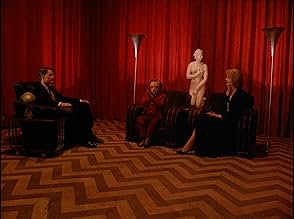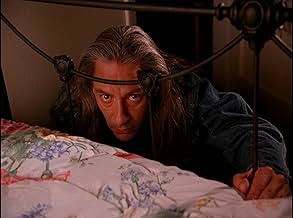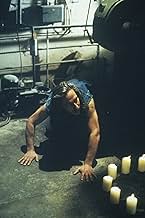Zen, or the Skill to Catch a Killer
- Episode aired Apr 19, 1990
- TV-14
- 47m
Ben Horne's brother, Jerry, arrives in Twin Peaks; together they travel to One Eyed Jack's and meet with the madam, Blackie O'Reilly. Audrey leaves a clue for Cooper. Deputy Hawk finds a blo... Read allBen Horne's brother, Jerry, arrives in Twin Peaks; together they travel to One Eyed Jack's and meet with the madam, Blackie O'Reilly. Audrey leaves a clue for Cooper. Deputy Hawk finds a bloody towel near the crime scene.Ben Horne's brother, Jerry, arrives in Twin Peaks; together they travel to One Eyed Jack's and meet with the madam, Blackie O'Reilly. Audrey leaves a clue for Cooper. Deputy Hawk finds a bloody towel near the crime scene.
- Shelly Johnson
- (as Madchen Amick)
- Leo Johnson
- (as Eric Da Re)
Featured reviews
And not to forget the rest of the show, it's getting more intricate, butt hat just makes you wan't to watch the next episode even more.
It's finally getting there, I give this episode a 10/10.
Apart from the concluding dream sequence, this episode also features Agent Cooper's hilarious stone-throwing deduction method!
The episode's title, "Zen, or the Skill to Catch a Killer," encapsulates the philosophical underpinning of Agent Dale Cooper's investigative method, which emphasizes intuition, mindfulness, and a kind of meditative awareness rather than brute force or conventional logic. This theme is explored through Cooper's interactions with the local sheriff's department and his own idiosyncratic approach to solving the murder of Laura Palmer. The episode balances these investigative elements with moments of surrealism, such as the introduction of Albert Rosenfield, an abrasive yet brilliant FBI forensic specialist whose acerbic wit and sharp intellect provide a counterpoint to Cooper's calm demeanor. The clash between Albert and the local law enforcement, particularly Sheriff Truman, adds a layer of tension and humor, enriching the character dynamics.
One of the episode's narrative highlights is the revelation of new clues and the deepening of existing character arcs. The tension between James Hurley and Donna Hayward continues to build, with their youthful romance providing a tender counterbalance to the darker themes. Meanwhile, the subplot involving the brothel One Eyed Jacks is introduced, with Audrey Horne revealing its existence to Cooper. This addition expands the series' exploration of the town's hidden vices and corrupt underbelly, linking the murder investigation to a broader social context. The scene where Audrey flirts with Cooper is charged with subtext and ambiguity, highlighting the complex interplay of innocence and seduction that permeates the show.
David Lynch's direction in this episode is particularly noteworthy for its seamless integration of the mundane and the surreal. The cinematography employs a muted color palette that enhances the eerie atmosphere, while the editing rhythmically oscillates between slow, contemplative moments and sudden bursts of tension. The dream sequences in the Black Lodge are visually distinct, using stark red curtains, checkerboard floors, and unsettling choreography to create a disorienting effect that contrasts with the more naturalistic scenes in the town. This juxtaposition reinforces the series' central theme of duality-the coexistence of light and darkness, reality and nightmare.
The performances in "Zen, or the Skill to Catch a Killer" are uniformly strong, with Kyle MacLachlan continuing to embody Agent Cooper's blend of earnestness and eccentricity. His calm, measured delivery anchors the episode, providing a human touch amid the surrealism. Miguel Ferrer's debut as Albert Rosenfield is a standout, his sharp sarcasm and no-nonsense attitude injecting energy and complexity into the ensemble. Sherilyn Fenn's Audrey Horne shines in her scenes, her flirtatious yet enigmatic presence adding layers to the town's social fabric. The supporting cast, including Michael Ontkean as Sheriff Truman and Mädchen Amick as Shelly Johnson, contribute nuanced performances that flesh out the town's multifaceted community.
Thematically, the episode delves into the nature of perception, reality, and the subconscious. The Black Lodge sequences suggest that the murder investigation is not merely a search for a physical killer but a confrontation with metaphysical evil embodied by entities like BOB and Mike. These supernatural elements elevate the narrative beyond a standard mystery, inviting viewers to engage with questions about the nature of good and evil, trauma, and the limits of human understanding. The dialogue in these scenes, with cryptic phrases such as "That gum you like is going to come back in style," has become iconic, symbolizing the show's embrace of poetic ambiguity.
"Zen, or the Skill to Catch a Killer" also advances the series' commentary on small-town America as a microcosm of broader societal tensions. The juxtaposition of the town's quaint exterior with its dark secrets reflects a postmodern critique of the idyllic American dream, exposing the fractures beneath the surface. This critique resonates with the political and cultural anxieties of the late 1980s and early 1990s, including concerns about hidden violence, corruption, and the fragility of community. Scholars have noted how Twin Peaks uses its supernatural and horror tropes as metaphors for these real-world issues, making the series a rich text for cultural analysis.
From a cinematic perspective, the episode stands out for its innovative blending of genres and styles. It combines elements of film noir, soap opera, horror, and surrealist art cinema, creating a hybrid form that challenges traditional television formats. Lynch's use of sound design, particularly the eerie score by Angelo Badalamenti, enhances the episode's unsettling mood and emotional depth. The editing choices, such as abrupt cuts and lingering close-ups, contribute to a sense of disorientation that mirrors the characters' psychological states.
However, the episode's ambitious narrative and stylistic choices may pose challenges for some viewers. The extended dream sequence at the beginning, while artistically impressive, disrupts narrative momentum and may alienate those expecting a more straightforward procedural drama. The dense symbolism and cryptic dialogue require active engagement and multiple viewings to fully appreciate, which can be both a strength and a barrier depending on the audience's preferences.
In conclusion, "Zen, or the Skill to Catch a Killer" is a defining episode of Twin Peaks that encapsulates the series' innovative fusion of mystery, surrealism, and psychological depth. Through its meticulous direction, compelling performances, and thematic richness, the episode transcends conventional television storytelling to explore profound questions about human nature, evil, and the elusive quest for truth. It challenges viewers to embrace ambiguity and reflect on the hidden dimensions of reality, making it a cornerstone of the show's enduring legacy. This episode not only advances the plot but also deepens the mythological and philosophical framework that distinguishes Twin Peaks as a groundbreaking work in the history of television and cinema.
Aside from the wild surrealism, there's also tons of great character moments, most notably the material surrounding the Hornes. Audrey does her famous and crushingly seductive dance while her uncle is introduced in a hilarious moment in which Lynch seems to be singing the praises of French sandwiches. This episode is most definitely one of the most successfully funny in the series even if it is not among the most consistently comical. Lynch is just a natural at absurdist humor and, therefore, whenever he's behind the camera, things are bound to get mind numbingly hilarious at some point.
I could go on and on describing the episode's great scenes and celebrating its genuine craftsmanship in terms of cinematography, scripting, character development, etc., but it's best that anyone who hasn't seen this one yet to watch it as soon as possible. If you're just getting into the series now and don't love it yet already, this classic might just change your mind!
Did you know
- TriviaCooper's dream is mostly made up of deleted scenes from Northwest Passage (1989) in its alternate international edit.
- GoofsWhen the Horne brothers go to the One Eyed jacks by boat, the scene appears to be running too fast, visible in the movements of Ben. However, this is an intentional editing choice by David Lynch, who liked to protect the natural environment by shooting scenes like this slower as needed just to speed them up in post-production.
- Quotes
The Man From another Place: [talking backwards; subtitled] I've got good news. That gum you like is going to come back in style.
- Crazy creditsInstead of the show's usual closing credits still shot of a photograph of Laura Palmer, the closing credits of this episode features footage of the Man from Another Place dancing.
- ConnectionsEdited from Twin Peaks (1989)
- SoundtracksPennsylvania 6-5000
Written by Jerry Gray and Carl Sigman
Details
- Runtime
- 47m
- Color
- Sound mix
- Aspect ratio
- 1.33 : 1






























